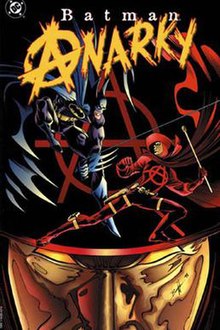| Batman: Anarky | |
|---|---|
 Cover of Batman: Anarky (1999), trade paperback edition; art by Norm Breyfogle and colors by Sherilyn van Valkenburgh. | |
| Publisher | DC Comics |
| Publication date | "Anarky in Gotham City" November - December 1989 "Anarky: Tomorrow Belongs To Us" Summer 1995 "Anarky" July - August 1995 "Metamorphosis" May - August 1997 |
| Genre | |
| Title(s) | "Anarky in Gotham City" Detective Comics #608-609 "Anarky: Tomorrow Belongs To Us" The Batman Chronicles #1 "Anarky" Batman: Shadow of the Bat #40-41 "Metamorphosis" Anarky vol. 1, #1-4 |
| ISBN | ISBN 1-56389-437-8 |
| Creative team | |
| Writer(s) | Alan Grant |
| Penciller(s) | "Anarky in Gotham City" Norm Breyfogle "Anarky: Tomorrow Belongs To Us" Staz Johnson "Anarky" John Paul Leon "Metamorphosis" Norm Breyfogle |
| Inker(s) | "Anarky in Gotham City" Steve Mitchell "Anarky: Tomorrow Belongs To Us" Cam Smith "Anarky" Ray McCarthy "Metamorphosis" Josef Rubinstein |
| Letterer(s) | "Anarky in Gotham City" Todd Klein "Anarky: Tomorrow Belongs To Us" Bill Oakley "Anarky" John Costanza "Metamorphosis" John Costanza |
| Colorist(s) | "Anarky in Gotham City" Adrienne Roy "Anarky: Tomorrow Belongs To Us" Phil Allen "Anarky" Sherilyn van Valkenburgh "Metamorphosis" Noelle Giddings |
Batman: Anarky is a 1999 trade paperback published by DC Comics. The book collects prominent appearances of Anarky, a comic book character created by Alan Grant and Norm Breyfogle. Although all of the collected stories were written by Alan Grant, various artists contributed to individual stories. Dual introductions were written by the creators - both of whom introduce the character and give insight into their role in Anarky's creation and development.
Featured as an antagonist in various Batman comics during the '90s, stories based on the character were highly thematic, political, and philosophical in tone. The majority of the collected stories ("Anarky in Gotham City", "Anarky: Tomorrow Belongs to Us", "Anarky") are influenced by the philosophy of anarchism, while the final story ("Metamorphosis") is influenced by Frank R. Wallace. Although anti-statism is the overarching theme of the collection, other concepts are explored. Anarky's characterization was expanded throughout the stories to present him first as a libertarian socialist and anarchist, and in the final story as a vehicle for explorations into atheism, rationalism, and bicameral mentality. Literary references are also utilized throughout the collected stories to stress the philosophical foundations of the character. The collection also tracks the character's evolution from a petty, street-crime fighting vigilante, to a competent freedom fighter in opposition to powerful forces of evil.
Critics have positively received some of the stories within the collection, analyzing Anarky as a unique force for political commentary and discussion within DC Comics' storytelling. However, the expansive growth of the character's unique abilities and characterization has also fueled criticism as having overpowered the character beyond suspension of disbelief.